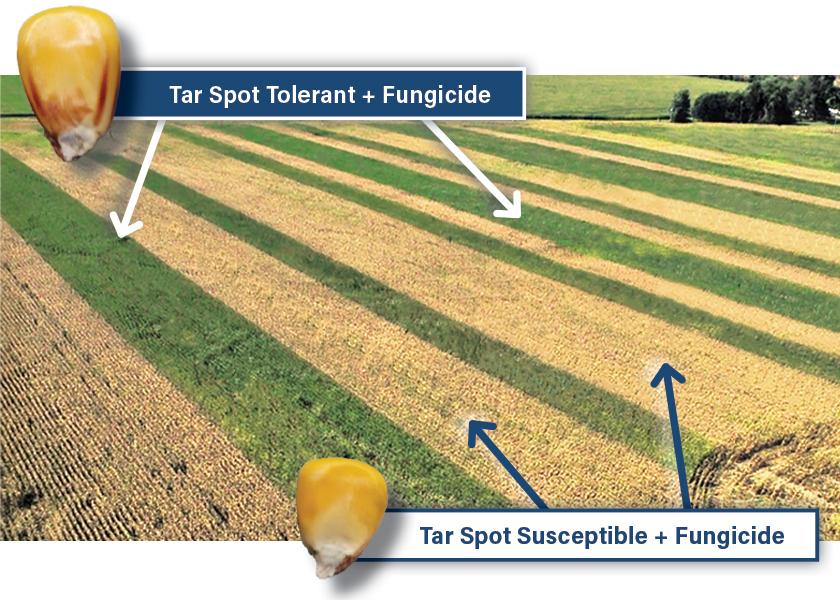Risk–Reward: Tar Spot Tolerant Versus Susceptible Hybrids

A late August wave of heat and humidity flipped the story on tar spot for agronomist Dennis Kopp.
“In 10 days, since the first of September, it’s been magnified 100%,” Kopp says.
He runs a large test plot trial for a farm in central Illinois. This year, as tar spot burned through varieties late in the season, he noticed some handled the fungus better than others.
“There are 14 to 15 companies and probably 100 different varieties in these plots,” Kopp says. “Tar spot is everywhere except on one or two varieties that are still green and seem to have suffered very little.”
He says despite two fungicide treatments, at V10 and R3, it’s clear genetic tolerance is the next logical step to manage the impacts of tar spot.
Hold the Line
“Your first line of defense is selecting a good hybrid,” says Missy Bauer, Farm Journal field agronomist and owner of B&M Crop Consulting, Coldwater, Mich. “If you’re planting in a high-risk situation, you really need to make sure it’s a more resistant type of hybrid.”
There are no products resistant to tar spot, but there are products more tolerant to tar spot, agrees John Brien, agronomy division manager at AgriGold. “We’ve been rating our products for the past three years on tar spot tolerance,” he adds.
Universities have found when average daily humidity is above 75%, crops are at risk.
Bauer confirms when conditions are right, tar spot tolerant varieties handle the pressure better than susceptible hybrids even when fungicide is used.
“In 2021, which was a bad tar spot year, using a hybrid with natural resistance and spraying with a fungicide, there was a 50-bu. increase when compared with a susceptible hybrid also sprayed with fungicide,” Bauer says. “That’s why I say hybrid is your No. 1 defense.”
Field Risk Matters
However, naturally tolerant hybrids don’t always end up being the best yielding varieties especially in years with low tar spot pressure. Over the course of several years, Bauer has witnessed anywhere from a 5-bu. to 15-bu. drop in yield performance for naturally tolerant hybrids in low tar spot pressure situations. In high-risk fields, like under irrigation, the trade-off is clear.
“I’m willing to give up 5 bu. to 15 bu. in a low-pressure year, but I’m not willing to give up 50 bu. in a high-risk situation,” Bauer says.
She recommends farmers start making notes of tar spot pressure, field by field and hybrid by hybrid, ahead of harvest.
“If I have high-risk fields, I need a strong hybrid with natural resistance for tar spot in combination with a good fungicide program,” Bauer says.
Tar spot is not going away.
“This is going to become part of our annual management plan from here on out,” Brien adds.







